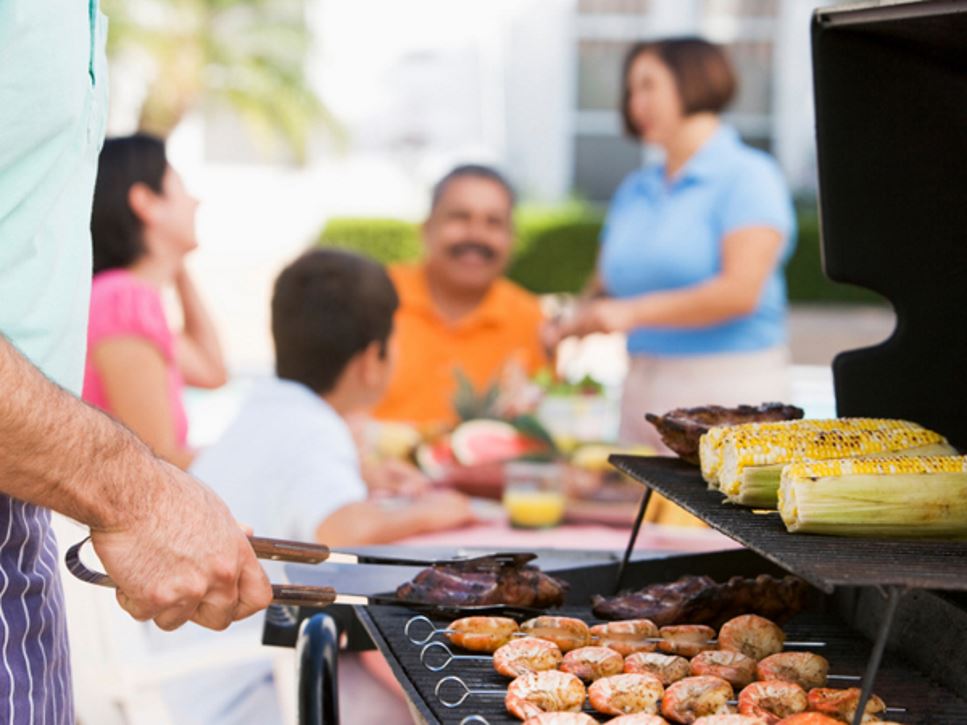Summer may be the traditional grilling season, but more than half of Americans are estimated to fire up the barbecue all year-round! Whether you're a seasonal griller or an year-round grill gourmet, beef up your food safety and nutrition with these helpful, hot-off-the-grill tips.
Develop a Taste for Safety
- Buy a Food Thermometer. When selecting a thermometer, read the package label. Be sure you're buying a type designed to use with food. There are many different types of food thermometers on the market.
- Clean Your Grill. Take time to make sure your grill is clean and ready for safe use before throwing on your favorite food. Clean your grill with hot, soapy water and remove any charred debris or grease buildup after each use.
Play it Safe
- Keep the Upper Hand. Proper food safety involves using different cutting boards when switching between raw meats and ready-to-eat foods. Remember to change your knives and other utensils when working with these foods, too, to avoid cross-contamination. Grilling shortcuts may save time, but they also can leave you with a case of foodborne illness! Take precautions. Wash cutting boards and utensils in hot, soapy water between uses. Or, use color-coded sets to keep raw meats, seafood and poultry and ready-to-eat foods separate. And always, always wash your hands!
- Embrace Marinating Musts. Marinate meat in the refrigerator (never on the counter or outside by the grill). And, if they’ve been used on raw meats, discard or bring leftover sauces to a boil before reusing them to prevent cross-contamination.
- Prevent Charring. While there are neither federal guidelines on grilled meat consumption, nor enough evidence connecting grilling meats to increased risk for cancers, there are ways to reduce the charring that typically occurs due to high-temperature cooking methods such as grilling, frying and broiling. Cut off visible fat on meats, consider precooking meat and fish to reduce the juices that drip into the flame and limit direct exposure of meat to open flames. Areas with charring also can be scraped off before eating.
- Use Your Food Thermometer. While a large percent of Americans may have a food thermometer, only a small percent consistently uses them to check the doneness of their hamburgers, chicken breasts and other grilled favorites. Using a food thermometer can help prevent overcooking, it’s also the only way to make sure foods reach a safe internal temperature.
Be Adventurous
- Be Mindful of Fat. Choose lean cuts of beef, pork, poultry, or seafood. Plant-based protein foods, like bean or tofu patties can also be leaner options.
- Pile on the Nutrients. Add flavor and nutrition to your meal with vegetables cooked right on the grill. Baste vegetables such as peppers, corn, eggplant or onions with a little olive oil or vinaigrette. Season them with herbs and place on a hot grill until they are tender. Or, sprinkle sliced zucchini, tomatoes and carrots with a little water and seasoning, wrap in heavy-duty aluminum foil and grill until vegetables are tender. See other vegetarian cookout ideas.
- Toast a Healthy Dessert. Grill fruit kebabs, pineapple slices or peach halves on low heat until the fruit is hot and slightly golden. Serve the fruit on top of a scoop of low-fat yogurt for a tasty and nutritious dessert.
When You're Chilling
- Watch the Clock. Refrigerate foods promptly and don’t leave perishable foods sitting out for more than two hours at room temperature. When surrounding temperatures are 90°F or more, the "two-hour rule" becomes the "one-hour rule." Next time you dine outdoors, keep guests safe by setting out perishable food items in smaller portions and for one-hour shifts. Or, keep perishable foods on ice to make sure they stay properly chilled.
- Remember the Condiments. Whether you’re using mayonnaise, salsa, ketchup or mustard, remember condiments also should not be left sitting out for more than two hours (one hour in weather above 90°F). It is a smart idea to bring a cooler or keep condiments in a bucket of ice.
- Let Leftovers Go. Keeping grilled foods for too long can affect their taste, quality and more importantly their safety. Food safety experts say grilled foods have a refrigerator life of only three to four days, so make sure your grilled leftovers are as safe as they are delicious. Refrigerate foods in shallow containers and write the date on top to help you keep track. Also be sure to reheat foods before serving a second time around and use a food thermometer to make sure they’ve reached an internal temperature of 165°F.
Find a Nutrition Expert
Looking for credible nutrition information and recommendations? The Academy of Nutrition and Dietetics' network of credentialed food and nutrition practitioners are ready to help!
